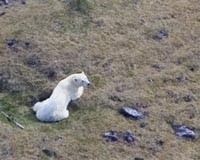| . |  |
. |
Vancouver, Canada (AFP) Oct 31, 2009 The Salish Sea may never appear on official navigation maps, but residents of western regions in the United States and Canada hope a new name will protect their shared coastal waters. A Washington State agency approved the new name Friday for the body of water off North America's west coast that includes Puget Sound, the Strait of Juan de Fuca, and Georgia Strait. The name is partly in honour of the aboriginal Salish people of the Pacific Northwest, said Bob Redling, spokesman for Washington's State Board on Geographic Names. "The broader reason is to change the way we think of these waters ... what happens in Puget Sound also happens in Georgia Strait," Redling told AFP in a phone interview from Olympia. The Salish Sea would stretch from northern Vancouver Island in Canada to Puget Sound in the United States and include countless inlets and coves fed by glaciers on the jagged and mountainous coastline. It would lap the edges of urban areas including Seattle, Tacoma and the western Canadian metropolis of Vancouver. "It's not as pristine as it used to be, but it's an incredible habitat for several endangered animals including salmon, killer whales, bald eagles and several shellfish," said Redling. "They need to be cleaned up, protected, and thought of in the same way, as as an ecological unit." The Washinton board voted Friday five to one for the symbolic name, which was previously approved in August by the British Columbia Geographical Names Office. The Salish Sea will officially come into existence if the name is formally approved, as expected, by federal agencies. The United States Board on Geographic Names is expected to decide on the issue in late November, while the Geographical Names Board of Canada has approved a resolution to adopt the name contingent on US approval, said a statement by Washington State. The idea for the name, put forward by American marine biology professor Bert Webber, has been promoted for years by environmentalists and scientists but only recently became generally popular. "It's more an idea rather than a practical thing," said Redling, noting the other names will remain on official maps. "I don't think anyone is going to get lost trying to find the Salish Sea on a map."
Share This Article With Planet Earth
Related Links Beyond the Ice Age
 US to give threatened polar bears vast 'critical habitat'
US to give threatened polar bears vast 'critical habitat'Washington (AFP) Oct 22, 2009 The United States on Thursday announced plans to designate more than 200,000 square miles in Alaska as critical habitat for polar bears, a key step towards increasing protection for the threatened species. "Proposing critical habitat for this iconic species is one step in the right direction to help this species stave off extinction, recognizing that the greatest threat to the polar bear is ... read more |
|
| The content herein, unless otherwise known to be public domain, are Copyright 1995-2009 - SpaceDaily. AFP and UPI Wire Stories are copyright Agence France-Presse and United Press International. ESA Portal Reports are copyright European Space Agency. All NASA sourced material is public domain. Additional copyrights may apply in whole or part to other bona fide parties. Advertising does not imply endorsement,agreement or approval of any opinions, statements or information provided by SpaceDaily on any Web page published or hosted by SpaceDaily. Privacy Statement |